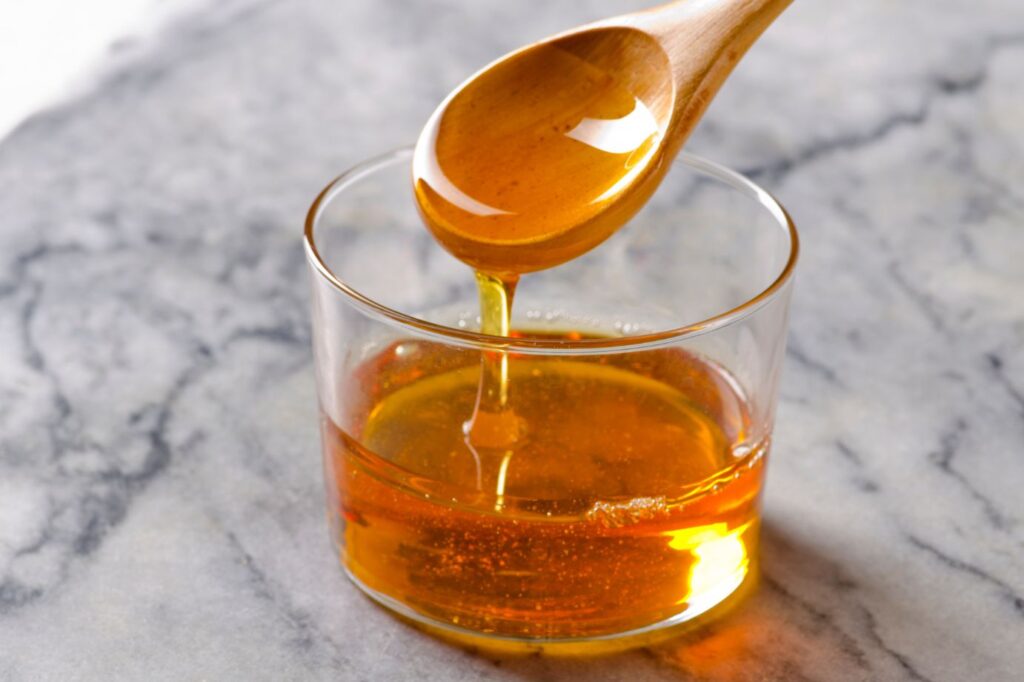5 Best Agave Nectar Substitute
In recent years, agave nectar has surged in popularity as a natural sweetener. Derived from the agave plant, this syrup has attracted health-conscious consumers due to its low glycemic index and sweet flavor profile. However, as with any food trend, some individuals are now seeking agave nectar substitute. Whether it’s due to taste preferences, health concerns, allergies, or simply a desire to explore new options, the search for agave substitutes is on the rise.
In this comprehensive guide, we’ll delve into five top alternatives to agave nectar. We’ll explore their unique characteristics, providing detailed information on measurement conversions, flavor profiles, and ideal uses. By the end of this article, you’ll be equipped with the knowledge to choose the perfect agave nectar substitute for your culinary adventures.
1. Honey
Honey, the sweet nectar produced by bees, has been cherished for millennia. Its rich flavor and versatility make it an excellent agave nectar substitute.
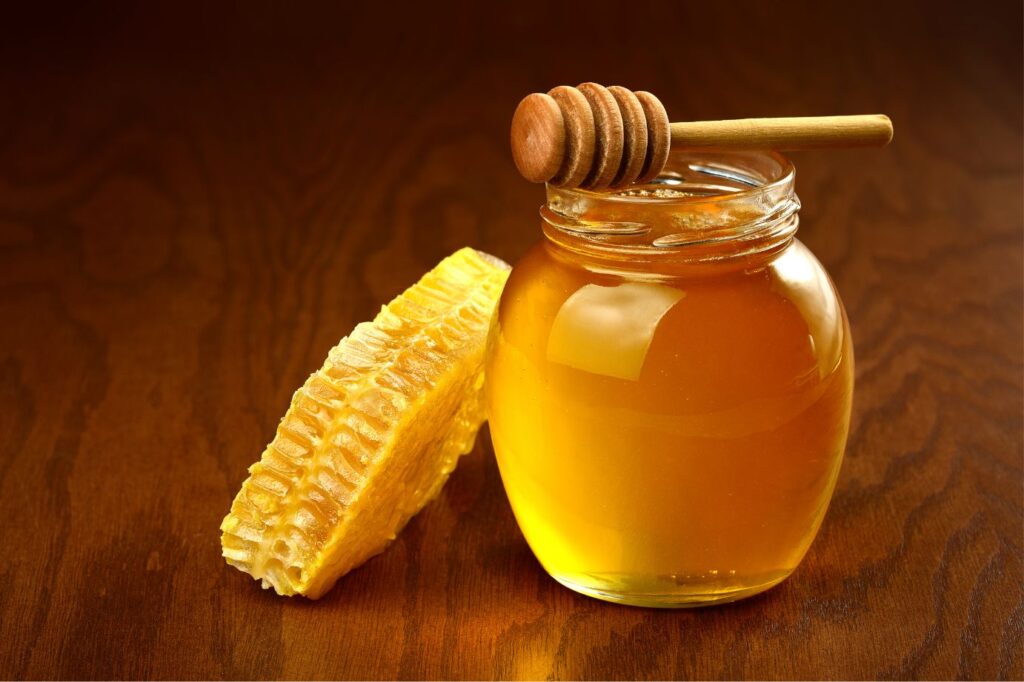
Pros
- Rich in antioxidants and has antibacterial properties
- Widely available and comes in many varieties (e.g., manuka, acacia, clover)
- Adds moisture to baked goods, extending their shelf life
- Contains trace amounts of vitamins and minerals
Cons
- Not suitable for vegans
- May crystallize over time (though this can be reversed with gentle heating)
- Has a stronger flavor that might overpower delicate dishes
- The fructose in honey can make baked goods brown faster.
Measurement conversion: Use 3/4 cup of honey for every 1 cup of agave nectar. Remember that honey is sweeter than agave, so you may need to adjust other liquids in your recipe.
Flavor profile: Honey offers a distinct floral sweetness that varies depending on the flowers the bees visited. It’s generally richer and more complex than agave nectar’s neutral sweetness. You might detect notes of fruit, flowers, or even a slight earthiness depending on the variety.
Best Uses:
- Baking: Honey shines in muffins, cakes, and cookies, adding moisture and a subtle floral note.
- Beverages: It’s excellent in tea, smoothies, and cocktails.
- Savory dishes: Use it in glazes for meats or in salad dressings for a sweet-savory balance.
- Raw applications: Drizzle over yogurt, oatmeal, or toast for a simple treat.
PRO TIP: For a milder flavor, try acacia honey. It's light in color and has a delicate taste that won't overpower other ingredients.
2. Maple Syrup
Maple syrup, tapped from the sap of maple trees, offers a unique flavor profile that can add depth to many recipes.
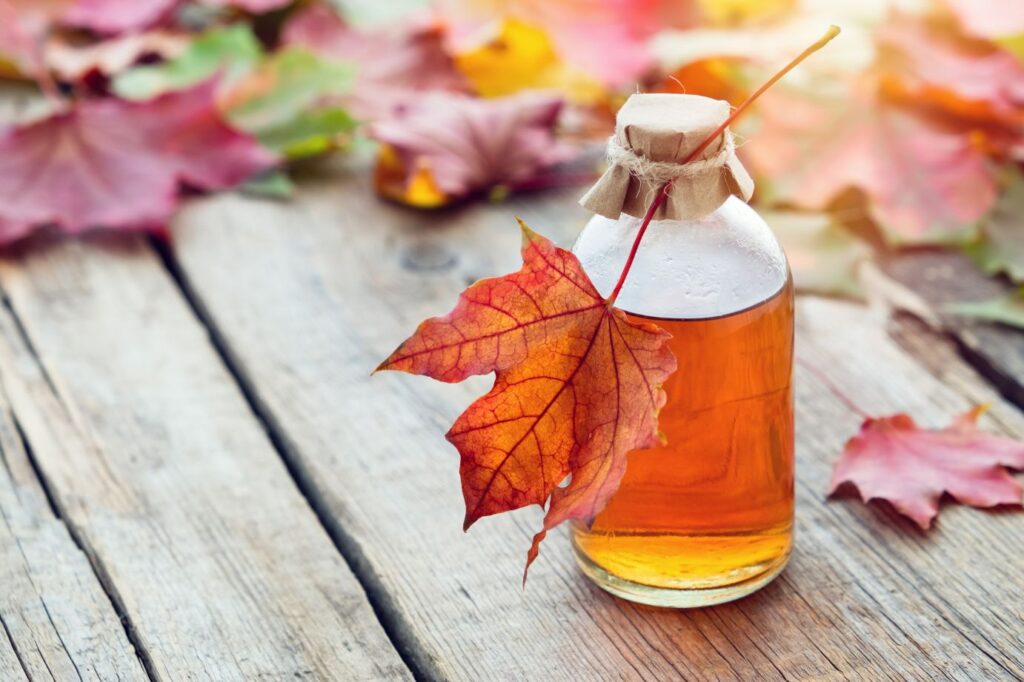
Pros
- Contains minerals like manganese, zinc, and potassium
- Comes in different grades for various flavor intensities (e.g., Golden, Amber, Dark, Very Dark)
- Adds a unique flavor to dishes
- Lower on the glycemic index than regular sugar
Cons
- More expensive than some other sweeteners
- The strong flavor may not be suitable for all recipes
- Can make baked goods brown more quickly due to its sugar content
Measurement conversion: Use a 1:1 ratio when substituting maple syrup for agave nectar. However, you might need to reduce other liquids in the recipe by about 3 tablespoons per cup of maple syrup used.
Flavor profile: Maple syrup has a distinct woodsy sweetness with notes of caramel and vanilla. It’s more robust than agave nectar’s mild flavor, with a complexity that can enhance both sweet and savory dishes.
Best Uses:
- Baking: Excellent in cookies, cakes, and pies. Try it in pecan pie for a delightful twist.
- Breakfast: The classic topping for pancakes, waffles, and French toast.
- Beverages: Adds depth to cocktails and can be used to sweeten coffee or tea.
- Savory applications: Use in glazes for salmon or pork, or in barbecue sauces.
PRO TIP: For baking, use a darker grade of maple syrup for a more pronounced flavor. For delicate dishes or beverages, opt for a lighter grade.
You May Also Like | What Foods to Avoid if Alkaline Phosphatase is High?
3. Coconut Sugar
Coconut sugar, made from coconut palm sap, has gained popularity as a lower glycemic alternative to regular sugar.
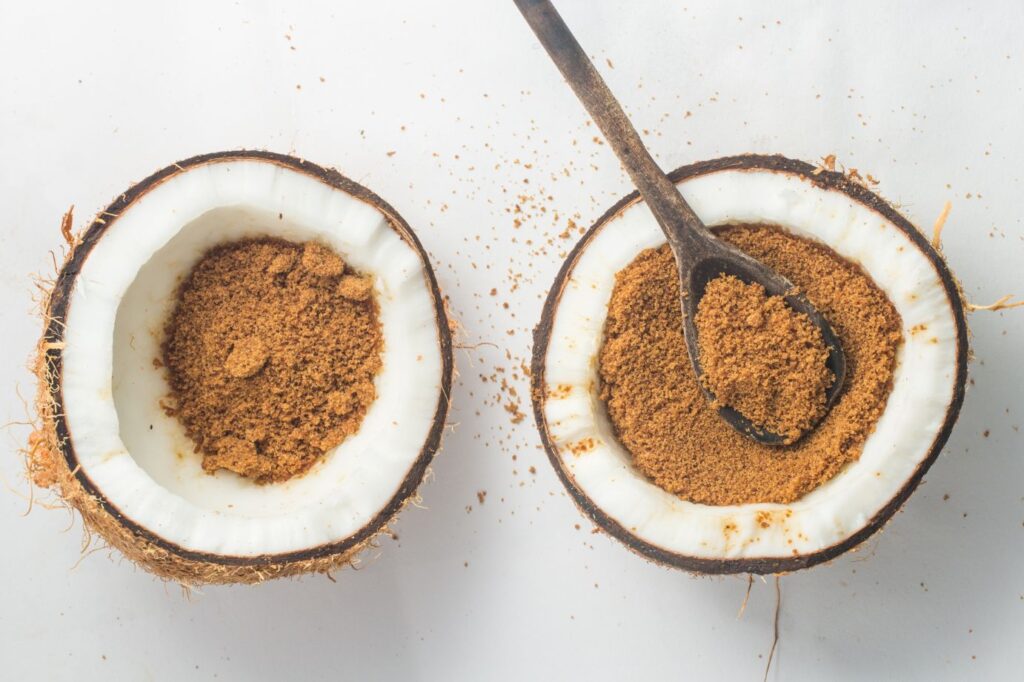
Pros
- Lower glycemic index than regular sugar (35 compared to 65 for table sugar)
- Coconut Sugar contains small amounts of nutrients such as iron, zinc, and potassium.
- Has a unique flavor that can enhance certain recipes
- Suitable for vegan diets
Cons
- More expensive than regular sugar
- May not readily dissolve in cold fluids.
- Can make baked goods slightly darker
- Despite its lower glycemic index, it’s still high in calories
Measurement conversion: Use a 1:1 ratio when substituting coconut sugar for agave nectar, but you may need to add a bit more liquid to your recipe (about 1 tablespoon per cup of coconut sugar).
Flavor profile: Coconut sugar has a subtle caramel flavor with hints of coconut. It’s less sweet than agave nectar but offers more complexity. The taste is often described as similar to brown sugar but with a slight tropical twist.
Best Uses:
- Baking: Works well in cookies, quick breads, and granola.
- Beverages: Great in coffee, tea, and homemade lemonades.
- Raw applications: Sprinkle over oatmeal or yogurt for added sweetness and texture.
- Asian cuisine: Its caramel notes work well in savory Asian dishes.
PRO TIP: When baking with coconut sugar, add 1/4 teaspoon of baking soda for every cup of coconut sugar to help baked goods rise properly.
4. Date Syrup
Date syrup, made from pureed dates, offers a rich, complex sweetness that can add depth to many dishes.
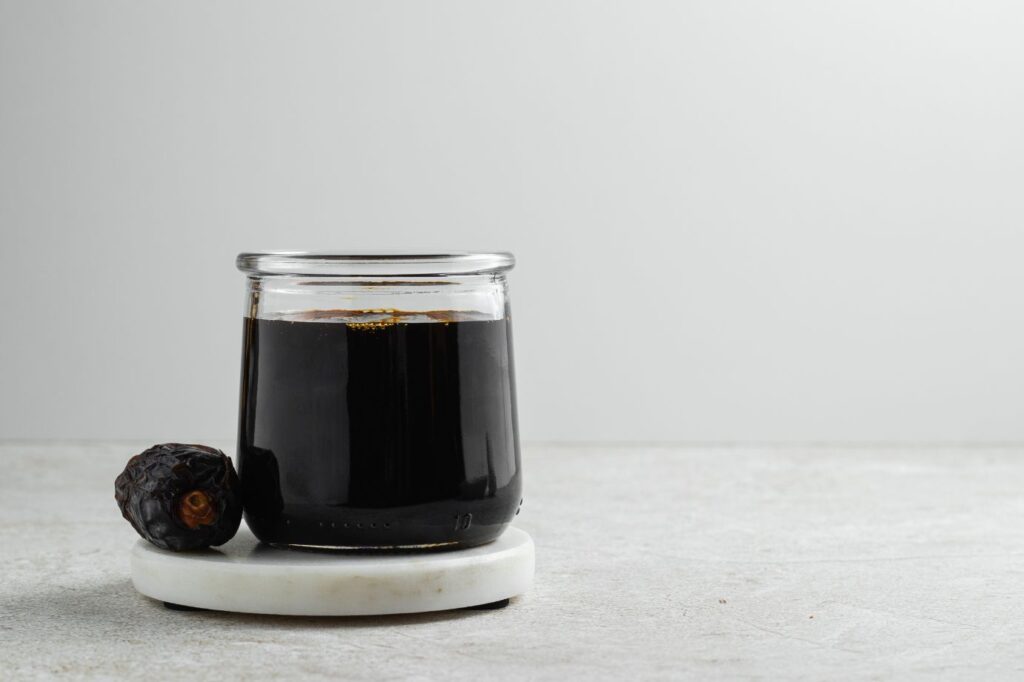
Pros
- Contains fiber and nutrients from whole dates, including potassium, magnesium, and antioxidants
- Adds moisture to baked goods
- Has a unique flavor that can enhance certain recipes
- Suitable for vegan diets
Cons
- More expensive than some other sweeteners
- The strong flavor may overpower delicate dishes
- Can make baked goods darker in color
- Higher in calories than some other sweeteners
Measurement conversion: Use a 1:1 ratio when substituting date syrup for agave nectar. You might need to reduce other liquids slightly, as date syrup is thicker than agave.
Flavor profile: Date syrup has a rich, caramel-like sweetness with a slightly fruity undertone. It’s more intense than agave nectar’s mild sweetness, with a complexity that can add depth to both sweet and savory recipes.
Best Uses:
- Baking: Excellent in dense cakes, cookies, and energy bars.
- Smoothies and beverages: Adds sweetness and a nutritional boost to smoothies and can be used in coffee or tea.
- Middle Eastern cuisine: Perfect for traditional recipes like baklava or as a glaze for roasted vegetables.
- Raw applications: Drizzle over yogurt, oatmeal, or use as a dip for fresh fruits.
PRO TIP: Make your own date syrup by blending soaked dates with water until smooth. This homemade version can be more cost-effective and allows you to control the consistency.
You May Also Like | Is Spring Water Better Than Purified Water?
5. Brown Rice Syrup
Brown rice syrup, made from fermented cooked rice, offers a mild sweetness that can be a good substitute for agave nectar in certain recipes.
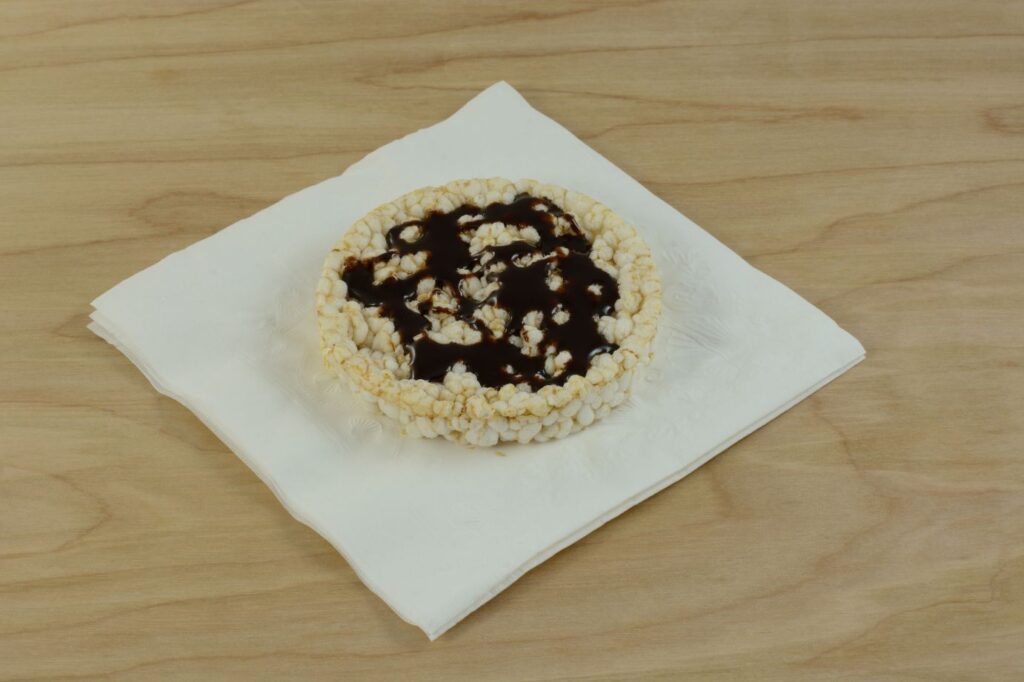
Pros
- Vegan-friendly option
- Has a very mild flavor that won’t overpower other ingredients
- Works well as a binding agent in no-bake recipes
- Fructose-free, making it suitable for those with fructose sensitivities
Cons
- Less sweet than other options, so you may need to use more
- Can make baked goods chewier and denser
- May contain trace amounts of arsenic, so it should be consumed in moderation
- Higher on the glycemic index than some other alternatives
Measurement conversion: Use 1 1/4 cups of brown rice syrup for every 1 cup of agave nectar. You should reduce the amount of other liquids in the recipe slightly.
Flavor profile: Brown rice syrup has a very mild, slightly nutty sweetness. It’s less sweet than agave nectar but has a similar neutral flavor, making it versatile for many applications.
Best Uses:
- Baking: Works well in granola bars, energy balls, and as a binding agent in no-bake recipes.
- Beverages: Can be used to sweeten teas and other drinks where a subtle sweetness is desired.
- Vegan recipes: Often used in vegan caramel or butterscotch sauces.
- Asian cuisine: Its mild flavor works well in certain Asian dishes and sauces.
PRO TIP: To enhance the flavor of brown rice syrup in baked goods, try adding a touch of vanilla extract or a pinch of salt to round out the taste.
Frequently Asked Questions
Yes, honey is generally considered healthier than agave syrup. Honey contains beneficial compounds like antioxidants, antibacterial properties, and vitamins and minerals that are destroyed during the processing of agave. Agave syrup is very high in fructose which can be harmful in excess
No, agave nectar is not healthier than sugar. While it has a lower glycemic index, agave nectar is higher in fructose and calories than regular sugar. Both should be consumed in moderation, as neither offers significant nutritional benefits and can contribute to health issues if overconsumed.
Agave nectar substitutes like honey, maple syrup, or coconut sugar are generally healthier than regular white sugar in moderation. However, they are still concentrated sources of sugar and calories. Honey in particular provides additional antioxidants and antibacterial properties that make it a better choice than agave.
Yes, there are some sugar-free substitutes that can be used in place of agave nectar. These include stevia, monk fruit sweetener, and erythritol. These zero-calorie sweeteners do not impact blood sugar levels. However, they may have a different taste and texture than agave.
Raw honey works best in raw food recipes as an agave nectar substitute. It’s unprocessed, retains its natural enzymes, and has a similar consistency to agave nectar. For vegan options, date syrup or coconut nectar can be good alternatives in raw recipes.

